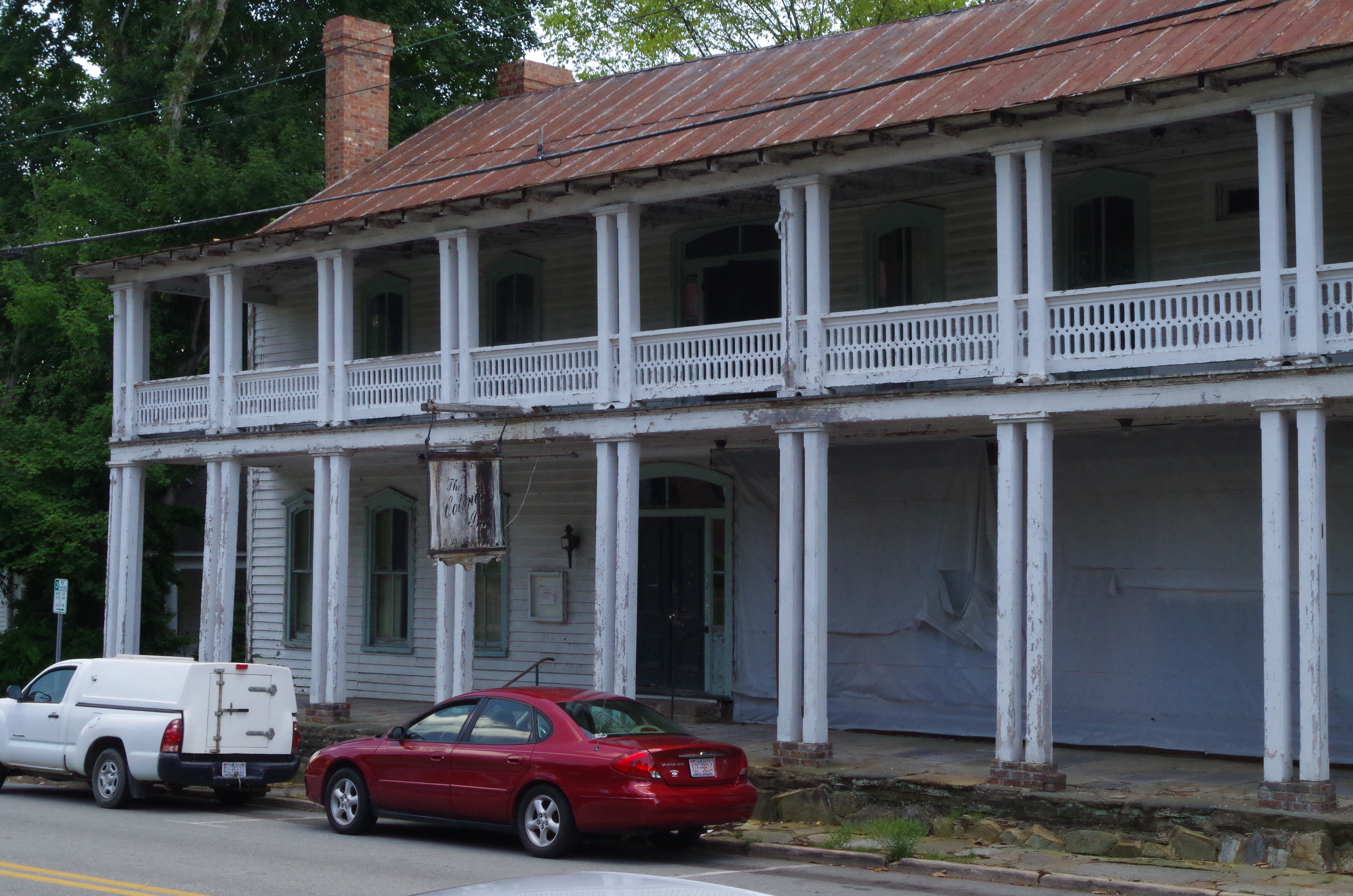The fate of the Colonial Inn, a historic property in downtown Hillsborough, has been mired by misunderstanding and miscommunication.
Built in 1838 at 153 West King St., the inn has touched the lives of all who lived in Hillsborough. Now, the inn has been deemed unfit for habitation, with a sign reading “condemned” across the door and a tarp covering half of the front porch.
The current owner, Francis Henry, bought the inn at a public auction in 2002 for $410,000. The property needed massive repairs. After clashes among Henry, the community and the town council, the inn’s future is stuck in limbo while the structure deteriorates.
“Those people who remember the inn are going to be gone,” said Diane Thompson Westbrook, whose parents, Lois and V.V. “Pete” Thompson, owned the inn from 1969 to 1985. “If it’s not repaired in the next 10 years, nobody’s going to remember.”
Westbrook remembers the hand-churned vanilla ice cream and the cornwallis yams. She remembers her father dressing up in colonial-era garb to march in the town parades. She remembers the loyal staff who kept the restaurant afloat on busy holidays when they would serve up to 1,000 people. She remembers her children playing beneath the magnolia trees.
Most of all, she remembers the sense of pride and community surrounding the inn.
“Lots of fraternity parties were held up there at night,” Westbrook said. “I remember daddy telling me some of the townspeople thought the music was too loud, so they called to Mayor (Fred) Cates and complained. Fred said, ‘I’m so glad you told me about that. I’ve been wanting a good party to go to.’ And he put on his tuxedo and went down at 10 or 11 at night.”
Westbrook fears that people will soon forget about the quaint inn that defined the downtown space for more than a century.

Bob Johnson helps run the Colonial Inn Preservation Association, a nonprofit organization that is currently raising money to try to buy the inn and renovate it. The organization began as a spin-off of a Facebook group that formed after Henry requested to demolish the building in 2007.
This spring, the town of Hillsborough paid $8,500 for the UNC School of Government’s Development Finance Initiative to analyze how the space could be repurposed. Development experts determined it would cost $2.9 million to buy and repair the inn.
If the town were to buy the property, Hillsborough planning director Margaret Hauth said it would be expensive and difficult to turn around to sell.
“If we get to the point where it’s deteriorated and the roof is falling in, we’ll have to have a conversation with our attorney and figure out what toolswe have available to us,” Hauth said. “I’d rather just not think about that unless we get there.”
In December 2014, the Colonial Inn Preservation Association put in an offer of $750,000 to buy the inn from Henry, but the offer was denied. Johnson said he has spoken with Henry about entering a joint venture. In UNC’s study, the $2.9 million price tag assumed the new owners would acquire the building for $142,000.
The property has a tax value of $658,658 – money the local government would like to recoup after investing time and resources into the preservation of the property.
As a nonprofit, Colonial Inn Preservation Association would not have to pay property taxes if they gained ownership of the inn. However, Johnson says the nonprofit would be able to solicit pro bono work to restore the inn.
“Is it in anyone’s best interest for this economically viable property that has historically contributed the town’s growth to end up in the hands of a nonprofit that wouldn’t have to pay on it? Certainly you could argue that’s preferable to demolition, but this is a discussion that may have to happen,” Hauth said.
Johnson said he didn’t think Henry had the financial means or the business savvy to manage the property at the time. After speaking with Henry, who declined to comment for this story, Johnson said he doesn’t believe Henry wants the historic property to go to waste.
“I think Francis Henry doesn’t want to tear down the inn,” Johnson said. “I think he is angry about something else entirely. He has some very legitimate complaints against how the town and the people have treated him over the years.”
Johnson said Henry bought the inn on the advice of his lawyer, but didn’t have a clear idea of how much work the property would need. He said Henry and the town residents clashed on several occasions, making Henry less willing to cooperate.
“He felt like he was vilified as this mean man who just wanted to tear down the inn,” Johnson said. “Those fears were partially justified because he had a history of demolishing historic property. Truthfully, I think he has a chance to be a hero to these people who want the inn to return to its glory days.”
The property became zoned residential land after the special use permit to run the Colonial Inn as a restaurant expired. Henry applied to have it rezoned commercial in 2007, but a group of neighbors signed a petition against the rezoning.
“Here he was with this costly and damaged property, which he might not have even wanted in the first place, and now he can’t even turn it into a profitable business,” Johnson said. “On top of that, the town deems it a significant historical site, so he can’t tear it down without their permission.”
Hauth said this property was initially zoned residential in an effort to protect the building. If it was zoned commercial, she said the value of the property would go up, offering an incentive for someone to come along and tear down the building to build a more profitable business.
“He was seeking central commercial, which is fairly broad category and fairly intense in the uses and amount of development it allows on a property,” Hauth said. “This includes parking decks, banks and restaurants with drive-thru windows.”
Hauth said this required the town council to look at a long list of possible uses and determine whether they would be appropriate for the space. Due to the property’s historic significance and location, the town could not sign off on the permit.
The property is still zoned residential, though the town has made it easier to apply for special use permits, which would allow for the building to be used as a specific type of business under agreed-upon conditions.
“There’s a lot of paperwork, but it’s a tool that works much better for everybody,” Hauth said. “The neighbors have a much better understanding of what they’re getting, the board has a better understanding of what’s going on in their town and the owner can be very specific about what he intends to do.”
Henry has not applied for a special use permit yet.
If the building continues to deteriorate, the town has two options. They could use the prevention of demolition by neglect ordinance, which requires repairs to visibly decrepit portions of the property. Or they could use the minimum housing code, which could only be used if the building has been abandoned. For this to be used, Henry would have to break contact with the town and stop paying taxes.
“A lot of folks hear that it’s condemned and think the building is going to fall down tomorrow, but it’s just not,” Hauth said. “It’s certainly not in fine shape, but it is still well within the rescue range.”
The UNC study found that the space could best be used as an restaurant, office or event venue.
“People seem to like to eat in this town, so another opportunity for that seems to be something that the market can absorb,” Hauth said.
Westbrook would like to see the space turned into a wedding venue.
“When my daughter got married 15 years ago, she was so sad that the inn was closed,” Westbrook said. “She said, ‘Mom, I don’t know of anywhere else I’d rather get married than the Colonial Inn.’ But of course she didn’t get to do that.”
This story appeared in the July 2015 issue of Southern Neighbor magazine.
